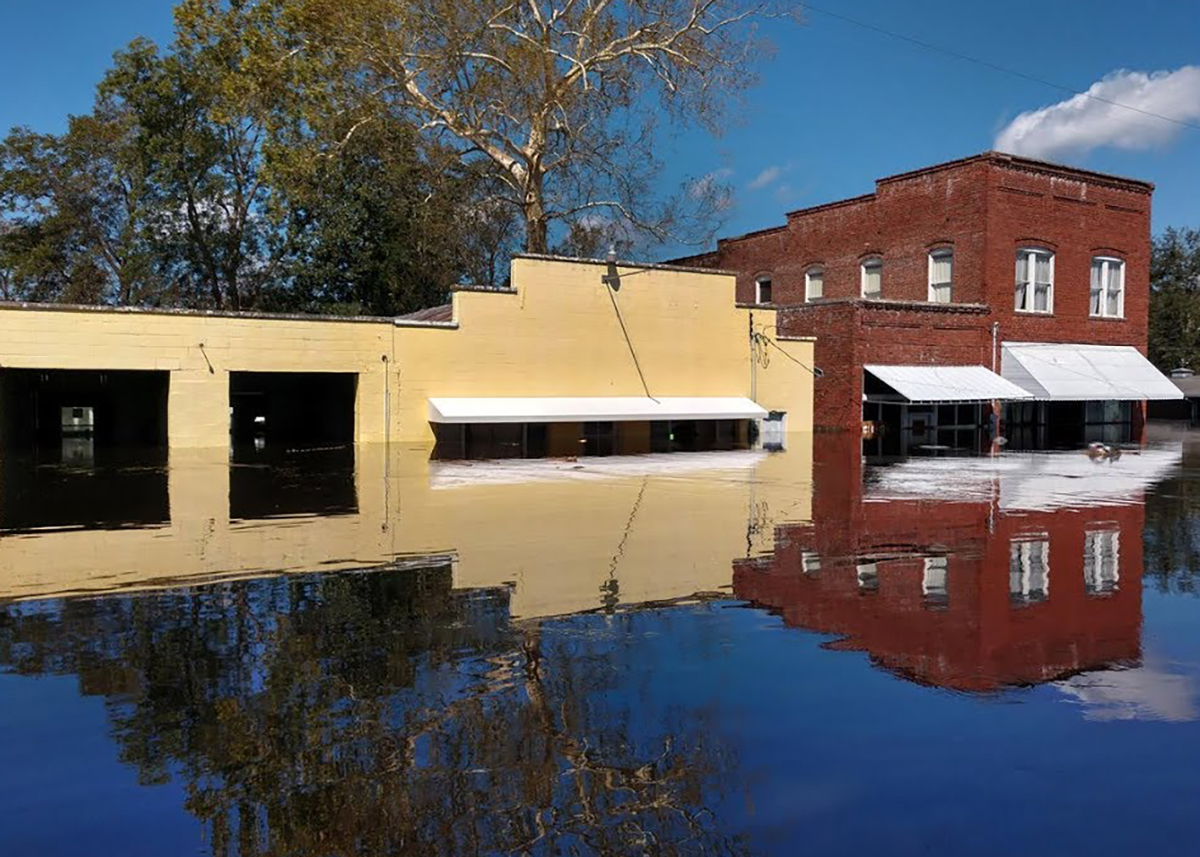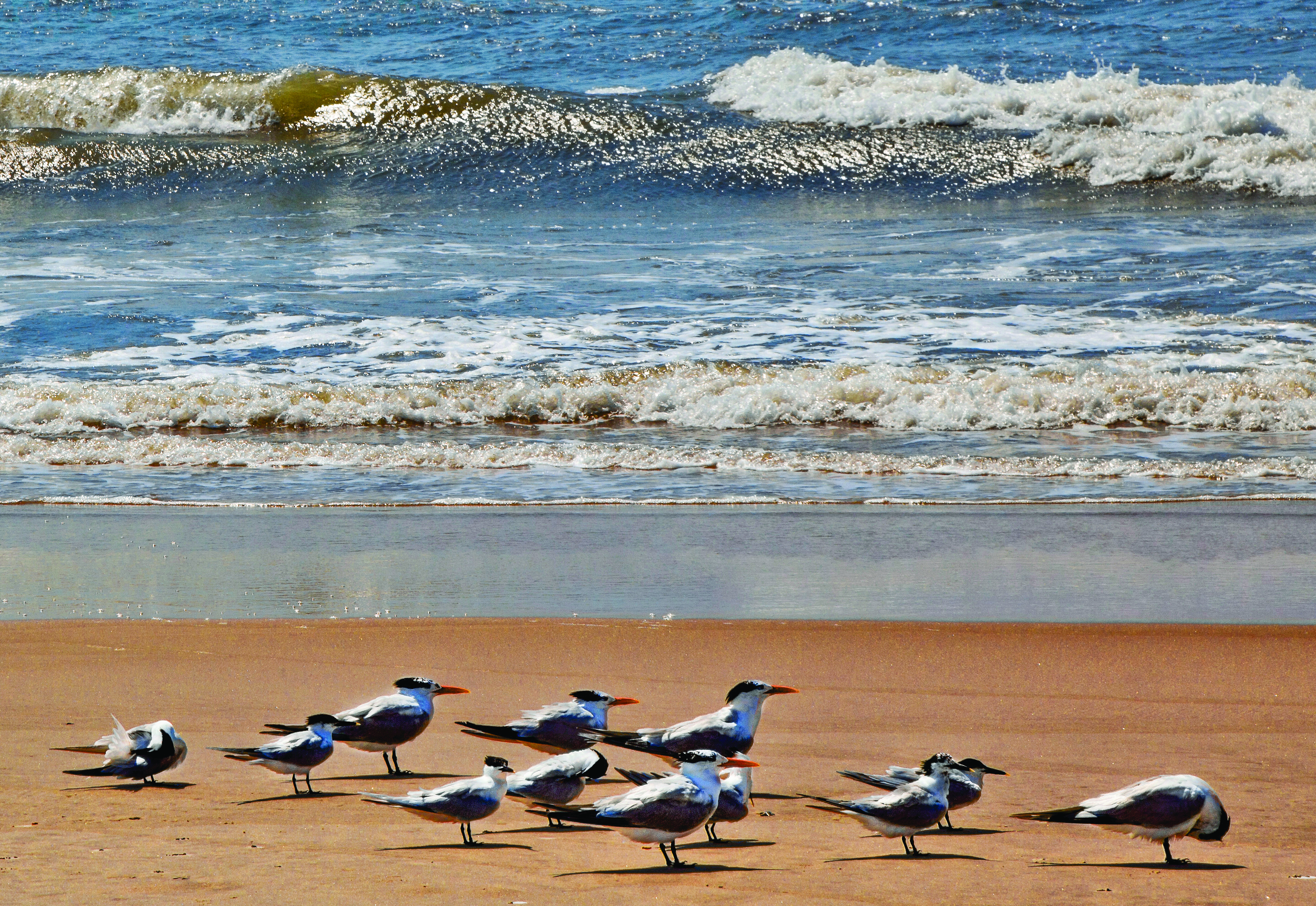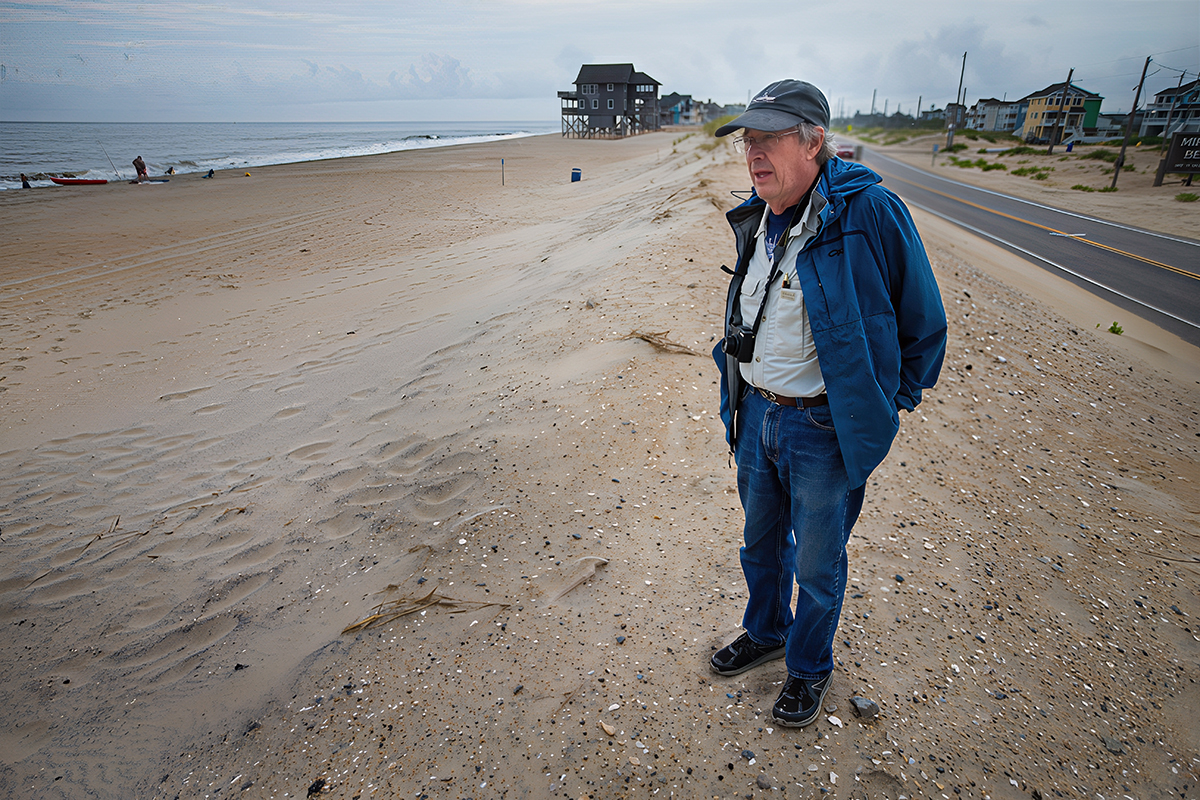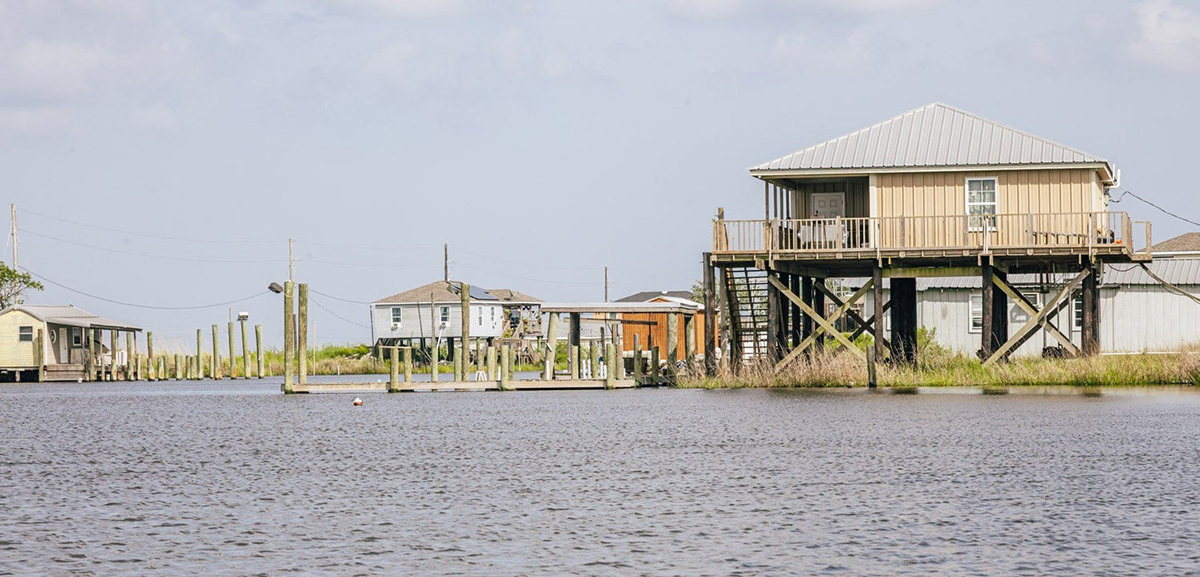WILMINGTON — The wind blew ferociously on the second floor of the Southport-Fort Fisher ferry where two young men working onboard stood side by side in khaki uniforms wearing dark sunglasses. Coby Benson and Chris Pittman agreed, drilling for oil and natural gas off the N.C. coast would be a good thing.
“I’m for it,” said Benson, a native of nearby Wilmington.
Supporter Spotlight
“The only way it would affect us would be positive,” said Pittman.
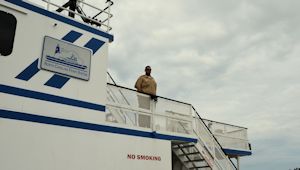
The men expressed how great it would be if more jobs came to the area, particularly maritime jobs. “The local economy would pick up, too, from more restaurants and housing,” Benson suggested.
A number of people I talked with on my travels along North Carolina’s southern coastline also supported offshore drilling. Old salts in Sneads Ferry, a fishing village in Onslow County, for instance, thought the industry could benefit the younger, local captains looking for work.
I found the group of fishermen on the last day of the weeklong road trip, hanging out in Mitchell’s Seafood Market. It wasn’t until I spoke the magic words, “Sammy Corbett sent me,” — the name of a Hampstead fisherman who chairs the Southeast Marine Fisheries Commission — that I was let into the circle.
“It might create a lot of jobs for the fishermen around here because this industry is going bad to the wayside, and it could give some options for some younger captains,” said Randy Millets, who runs the fish house, which is just down the street from where he was raised.
Supporter Spotlight
He sat back in his office chair within a white room that had nothing more than a soda machine in the corner and a tall counter against which a handful of other fishermen leaned. A middle-aged man, he looked to be the youngest of the group. He wore a light blue shirt and cap that magnified the ocean color of his eyes.
In Oil We Trust
“They had that bad thing happen in Louisiana, but BP took care of them,” said Millets about the oil company responsible for the Deepwater Horizon spill in 2010.
Ray Liberman, an older man standing near me, joined in. “Yeah, I know one guy that become a millionaire over it,” he said, referring to a shrimper who was paid to help clean the spill.
The fishermen were fairly confident that the oil industry would look out for them in the event of a spill and any resulting effects to their livelihoods, but they wanted some reassurance. “We all kind of got an idea of what went on in Louisiana, but we’re not from Louisiana so we didn’t truly experience it, see. There would be a lot of questions we’d like to ask somebody,” Millets said.
Like, if there were pipelines, where would they run on the seafloor and how many? The fishermen wouldn’t be able to drag their trawling nets over a pipeline, and they could easily lose their rigs if they ran across one by mistake, Millets said.
“Most times us guys will sit around and we’ll talk about it, and this one will bring this view up and that view up,” he said. “I might could change tomorrow if we got to talking about it. But, one thing they won’t change my mind on is I do want this country to depend on itself.
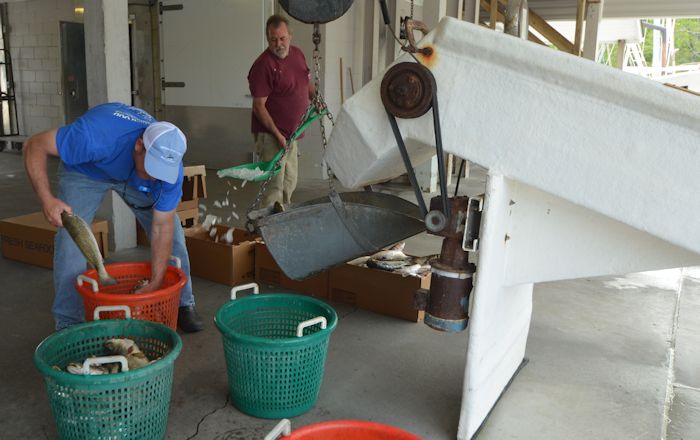
“Me, personally, I’m a patriot,” said Millet. “So whether I benefit anything at all from it, at least we’re dependent on our own country.”
Energy independence was the one dominant argument expressed by those not opposed to offshore drilling. So, how dependent is the United States on foreign oil?
In the U.S., net imports of petroleum amounted to 27 percent of what we consumed in 2014 — the lowest annual average since 1985. This has largely been driven by both a boom in natural gas production, more fuel-efficient vehicles and other factors.
You may find it surprising that 90 percent of the petroleum we consumed last year was either produced domestically or imported from Canada, according the Energy Information Administration. We import more petroleum from our Canadian neighbors than all the Persian Gulf countries combined.
Alternatives Instead
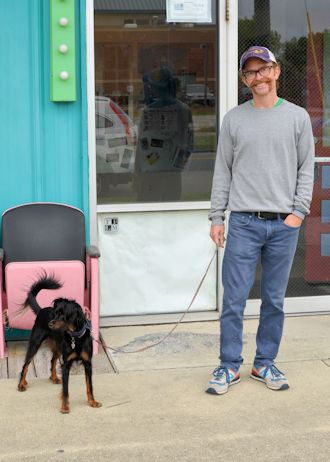
A prevailing mantra of those against offshore drilling was the need to aggressively find alternative sources of energy.
That’s what Wilmington native Dan Brawley said on the morning we met near downtown. Wilmington is the largest city on the N.C. coast with a university, a college and roughly 112,000 residents. The slender man with a handlebar mustache, shoulder-length, wiry blond hair and eyeglasses is a leader in Wilmington’s arts community. He’s the executive director of the annual independent Cucalorus film festival and the founder and manager of the Independent Art Co.
“The compelling argument for drilling and exploring for energy in delicate ecosystems is going to become more urgent and more convincing over time,” said Brawley. “So as we’re discussing offshore drilling energy exploration, we should be putting a lot more of our resources into supporting scientists and other inventors, researchers to discover that thing that might just save our ability to live on this planet.”
Brawley and I took a walk with his dog Izzy over to Folks Café on Princess Street. Inside, we chose a seat by a large window to keep an eye out for his dog, which was lying on the ground and tied to a post.
In a way, Brawley said, knowing how animalistic humans can be makes him feel a little better about practices like offshore drilling and fracking. He compared it to a colony of ants incapable of conserving a discovered mound of sugar. “In some ways it seems a little bit inevitable that we’re going to go out and tear the earth apart to find energy,” he said.
“Can we come up with a reasonable way to do that?” he wondered, stating the importance of getting back to a place where both political parties can negotiate and find common ground. For many locals, including Brawley, entertaining whether to drill off the N.C. coast feels like a one-sided conversation in which the only the titan fossil fuel industry will be heard.
“It feels to me like this conversation is about ‘How does it feel to be a loser’ a little bit, you know?” he said. “Given the people who are in power. I mean we have a 25-year-set-with-Duke-Energy as our governor, and we know how incredibly powerful the energy sector is in Washington.
“So it’s a David and Goliath battle,” said Brawley.
“People Power”

Even so, Carolina Beach’s Ethan Crouch believes in “people power.”
“It becomes inspiring, to be honest,” Crouch said, “that the people’s voice is still loud and the people want to really, in spite of the literally unlimited amount of dollars that we’re fighting against, people are still coming out; people are still voicing their opinions; people are still signing petitions; people are still calling their senators, still writing letters and still doing whatever they can as citizens to protect what we love so much.”
He was among the more than 300 people who crowded into a Kure Beach town council meeting in January 2014 to voice their opposition to drilling. It was the beginning of a grassroots movement throughout East Coast towns to begin passing resolutions against seismic surveys and offshore drilling. Kure Beach Mayor Dean Lambeth may have lit the match when he signed onto an industry-sponsored letter endorsing exploration for oil and natural gas without any public input.
Crouch has had a large role in spearheading Pleasure Island’s opposition effort as the local chair of Surfrider, an environmental nonprofit organization dedicated to protecting oceans and beaches.
“It comes down to I love the ocean. It’s not worth putting at risk,” said Crouch. “And our — not just love — but our existing economy thrives in this area off clean and healthy beaches, not off an industrialized coastline. You look to the Gulf Coast and that’s where you see the industrialized beaches, literally refineries on the beach.
“That’s not the vibe of North Carolina. That’s not what makes North Carolina great. That’s not why people move here. That’s not why people start businesses here. It’s for those pristine and clean beaches,” he said.
Sean Cook is one of those people who decided to move to Carolina Beach and start a few businesses. He owns Pleasure Island Rentals, which rents out everything from kayaks and paddle boards to beach chairs and umbrellas. He said, “Our rental shop depends 100 percent on tourism dollars and there’s so many other businesses that are the same way all the way up and down the coast.”
I met Cook for a drink at his other business, an oyster bar restaurant. This one was in downtown Wilmington. He’s not for offshore drilling for several reasons. A spill, he said, could potentially affect the local tourism economy.
“If I’m not making money in Carolina Beach and I’m struggling to survive, I’m not coming downtown (to Wilmington) to spend money. I’m not going to Mayfair to buy overpriced clothing. The trickledown effect is so enormous,” Cook said.
Visitors spent roughly $4 billion along North Carolina’s coast in 2013, according to the state Department of Commerce. And every year, more than 11 million people visit the state’s beaches and coastal towns. Kure Beach, for example, has roughly 2,000 year-round residents, but swells to a population between 400,000 and 700,000 during the summer. This goes for most of the towns along the state’s southern coastline. It appears tourism not only drives their economies but greatly shapes their culture.
Cook asked, where will those 11 million tourists vacation if there was an oil spill of the N.C. coast? Nobody wants to come to the coast to swim in sludge, he said.
However, not all those who work in North Carolina’s coastal tourism industry worry about such accidents. The pier owners of Kure Beach and Oak Island weren’t opposed to drilling offshore. In reference to the BP Horizon oil spill in the Gulf of Mexico, Mike Robertson, Kure’s pier owner, said, “You have to consider all the gas and oil we’ve gotten from the Gulf and all the times it didn’t fail.”
If we’re going to keep using oil and gas products, we need to keep exploring for them, he said. Robertson pointed out that the oil-producing states on the Gulf Coast have some of the best inshore fishing today. He justified the risk of oil spills for the sake of the country’s dominant source of energy with this, “Sometimes you have to break an egg, and bad things happen to good people.”
Born and raised in Kure Beach, he remembers oil washing up on the sand during World War II. “Nature bounces back,” he said. “It ain’t pretty … Now there’s more people to see it and more press to report it.”
No NIMBYs Here

Like Robertson, other coastal residents thought it was unfair to have a “not in my backyard” attitude. Marty Evans of Wilmington doesn’t like the idea of drilling off the N.C. coast and wants the state and country to pursue alternatives, but, he said, “Until I totally swear off cars or oil, I can’t say, ‘How dare you collect oil in my backyard. Go do it somewhere else.’”
There are other tourism-based jobs that stand to potentially benefit from offshore drilling, namely recreational fishing. Oil rig structures create artificial reef habitats that can attract fish. Fishing near rigs – both active and inactive – is legal and popular along the Gulf Coast.
Jon Huff, a recreational fishing guide, lives in a quiet, middle-class neighborhood in Ogden, a suburb north of Wilmington. “In the short term,” he said, “I know if there were offshore platforms out of here it’d be great fishing spots. That’s the first thing you think about.”
“Louisiana is still much more of a destination than we are for recreational fishing,” Huff said. “If it was going to hurt my business from an ecological standpoint, you know, it hasn’t in Louisiana, so how?”
Still, Huff said he had mixed thoughts about drilling and confessed that he didn’t know what the environmental ramifications would be if North Carolina pursued offshore drilling.
If there were three questions people most often said they wanted answers to, they were these: What is the “real” need; what are the “real” environmental effects; and what are the “real” benefits of offshore drilling?
North to Pender
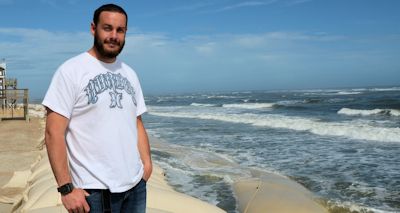
Driving north into Pender County, traffic and roadside development dissipates while the pine forests stretch farther and farther without interruption. The county has fewer than half as many people living in it as Brunswick, New Hanover and Onslow counties and also a smaller population than Carteret County, with roughly 56,000 residents, according to the N.C. Office of Budget and Management. Its percentage of people living below the poverty level was greater than the state and national averages and its average annual income level was lower, too.
Pender County traditionally had an agriculture-based economy. Today however, only about 3 percent of the population is in agriculture, forestry, fishing, hunting or mining. The greatest employment sector is in educational services, health care and social assistance, around 19 percent, followed by retail and construction. Along its coastline though, I met nearly a dozen commercial fisherman, all with different things to say.
Sammy Corbett, of Hampstead, said, “I can’t be against anything that helps the economy.” He feels confident that the fisheries would benefit from the habitat created by the structure of rigs, and that drilling can be done without harming the environment or ecosystem. “I think the [safety] measures have already been taken to make it a lot better,” he said.
I met him at the fish market in Surf City, at the Crab Shack restaurant and fishing dock. There, I talked to watermen from various corners of Pender County’s coast, including those working that day, scaling fish and prepping iced coolers. Ethan Thomas, a tall, slender man wearing dark green waders and a faded orange visor, kept moving around the group discussion, smoking one cigarette after the other. His skin, like the others, had a rough, darkened tint from working under the sun at sea. I didn’t think he was paying any mind to the ongoing conversation about offshore drilling until he said, “I wouldn’t recommend it,” as he passed by.
Thomas used to be a commercial fisherman. Now he works at the market where the pay is more stable. The open seas off this coast are tumultuous, he explained. Commercial fishermen are lucky if they can fish offshore five times in January or February or March, he said, whereas conditions in the Gulf make for access to deep water easier throughout the year. Despite the habitat rigs or platforms could create for fisheries, Thomas said he doesn’t think it’s worth the risk of a spill.
With a sharp glance and one long drag of his cigarette, he concludes, “Oil and water don’t mix.”
By the time the road trip wrapped up in Morehead City, I was left with an array of responses from the 80 people I talked to about offshore drilling. Nearly half of them were against it. While there were an equal number of men opposed as not opposed, no women decidedly supported offshore drilling. The remainder were either undecided or said they were too uninformed to have an opinion.
Wednesday: The Outer Banks



